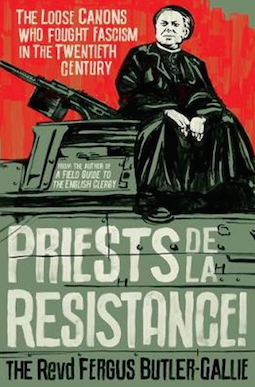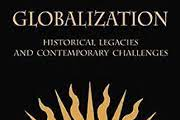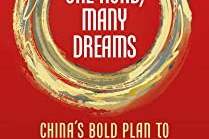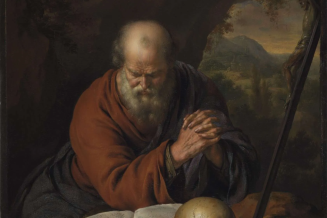Book: Priests de la Resistance! Loose Canons who fought Fascism in the Twentieth Century

Book: Priests de la Resistance! Loose Canons who fought Fascism in the Twentieth Century by Revd Fergus Butler-Gaille
Publisher: Oneworld Publications (2020)
One of the interesting features of difficulty, such as being in a fascist state, is that it can bring to the fore qualities in certain people which no-one suspected they had. Least of all them.
Examples of this phenomenon are found in this rather marvellous little book of religious people Catholics mostly, and not just priests or men, who became men and women of great courage in the face of the threat posed by National Socialism in Germany in the 1930's and 40's, that is, before, during and after World War II.
The accounts given of their personalities and lives are presented in a very readable and entertaining way that brings out the force of each one's personality and the background to their heroic and dangerous feats.
Fifteen personalities are considered who encountered and faced down the rise of fascism with ingenuity, deceit and intelligence all of which combined to bring their essential religious qualities to the fore. Here are just few of those remarkable characters from this engrossing little book.
Canon Kir from Dijon, France, was an avid consumer of the finest food and drink from that region, sometimes taking some hours over lunch always washed down by a blanc de cassis, a whole bottle of red, and some sparkling wine to end before heading back to his presbytery for an afternoon's labour at his desk.
He had been the grateful recipient of an education from the Catholic Church which was enhanced by his ability for theatrics and a sharp mind which found their resting place in his training for the priesthood and he was ordained in 1901. He was well liked and he enjoyed his meals as well as dressing in his distinctive beret-cassock as he paraded around his diocese and visited the cafes and churches.
His local bishop had him work as an active representative of the national Catholic political movement in that region of France which he enjoyed as it gave him ample opportunity for travel and dining. He was sixty-three when war was declared in the early autumn of 1939 and found that political leadership collapsed thus paving the way for the Germans to occupy.
Canon Kir found his new mission in making life as difficult as possible for the invading Nazis.
He made immediate contact with the Resistance and became friends with Communists to whom he had been publically rude in his previous existence on the Catholic political trail. Kir ensured that they had places to hide, the shipments destined for the German troops went missing, and that the good people of Dijon could continue their love affair with rich and fine cuisine even though rationing had been introduced.
He used obfuscation, charm, deceit, flattery and bonhomie in the service of his aims which was to liberate prisoners, move supplies, do some gun running and distribute anti-fascist propaganda, as well as leading his people.
For his trouble he was twice imprisoned and managed to escape, shot and then became mayor of Dijon. He later escaped the clutches of the Gestapo and, when the Nazis had been defeated, returned to his beloved homeland sitting on top of a tank in his priest's cassock with his beret fixed on his head.
His bravery was rewarded by his becoming an MP and being decorated by de Gaulle. He became an advocate for peace between nations and championed the twinning of towns in what became the Iron Curtain.
He found an unlikely friend in Khrushchev who later visited him in his home town. Canon Kir served the Catholic Church for sixty-five years and died aged ninety-two having given his name to the celebrated drink, the Kir Royale as well as a fine example of being a priest, politician, speechwriter, spy, wine-guzzler and would-be martyr.
He led his people through a dreadful time, gave them leadership, saved synagogues and coordinated jailbreaks whilst being none the worse for wear having imbued considerable amounts of fine wines and devouring the produce at the dining tables of his favourite cafes.
In the Gospel of St Matthew, Christ sends his disciples out to be as 'wise as serpents and innocent as doves'. Few of them can claim to have embodied this with as much joie de vivire as Canon Kir.
Dietrich Bonheoffer was, by all accounts, a tough character who was physically intimidating, intellectually precise and very charming, a double agent and would-be assassin. Quite a tally for a man who was an ordained minister in the Lutheran-Reformed Church.
He also happens to be one the major figures in theology in the 20th century. However it wasn't all good news for him: failed at several things such as making his church oppose Nazisim, being part of the attempt to kill Hitler and, tragically, saving his own life.
However his faith in Christ was the bulwark of his life: that love is stronger than death and that his own life counted as next to nothing. Originally from Germany, as a young man he travelled to the USA and Cuba and was shocked at the treatment meted out to black men, women and children which was totally contrary to the Gospel of Jesus Christ he knew so well.
Back in his homeland he became a minister. Hitler was democratically elected Chancellor of Germany and this caused Bonheoffer to announce on public radio that Hitler was a seducer sent to lead the people astray. Such was his verbal attack that he was taken off the air before he finished. He continued to speak out although his own church did not.
He then moved to London for which many criticised him, including Barth, this stung, but he made contacts in the intelligence world which were to prove useful later on. Poland was next where he continued with his preaching and opposing the Nazis and utilising his intelligence contacts which he now had in Berlin and London.
By this point he was banned from even entering Germany and from taking up any public position so he returned to America. War was then declared on Europe and so he returned to Germany and managed to enter. He wanted to try to bring the fascist regime down from inside the country.
To this end he arranged the escape of a large number of Jews via Switzerland to London but was arrested for his efforts. After a year in prison he wrote The Cost of Discipleship. Fatally, he conspired in the attempted assassination of Hitler, which failed, and revenge was brutal once the documents were found which named the would-be assassins.
After a show trial Dietrich Bonheoffer was hanged by piano wire having accepted the sentence in silence before the SS judge. His life bore witness to the following of Christ to the point of death.
Sister Sara Salkahazi from present-day Slovakia was a chain-smoking former atheist who, as a nun, undertook acts of subterfuge, salvation and sacrifice which saved many lives, so much so that the earned the respect of her religious order, the Jewish World Holocaust Memorial Centre and the Church.
Before her vocation, Sara was a prominent journalist, well-known in socialist circles in Czechoslovakia and Hungary and made public declarations of agnosticism, even atheism, at times. She had been brought up as a Catholic but had firmly rejected it, nevertheless she admired its educational and charitable works especially with poor women in the cities.
Eventually she approached the Society of the Sisters of Social Service but they were very doubtful that, give her habits, she could actually take the habit so they refused her. Sara did not give up at this rejection and eventually gained admittance to the novitiate and took first vows. Sadly she was sent away after that and had a nervous breakdown which took her away from the work she loved with women.
She also learned that her religious order considered her unsuitable for their way of life and turned her application for full membership down. This was another devastating blow for Sara. She then sought to travel to Brazil and to work as a missionary but never did.
The Second World War intervened. Her order eventually gave way and admitted her and she was put in charge of an institute of ten thousand members and responsible for their care and well-being. However, deportations began but Hungarian Christians and Catholics were reticent to help Jews so she looked for shelters for them and at some risk to herself.
Sadly, she encountered major difficulties in this work, not least because of a Slovakian who was the president and also a Catholic priest who handed over large numbers of Jews to the Nazis. Indeed, even Hitler commented with some surprise, "it is interesting how this little priest is sending us the Jews!" It seems that anti-Semitism and the Christian faith were disconcertingly close.
Sister Sara took a very different view. She used nun's habits as disguises for mostly young women and she saved over one thousand souls this way. She wrote a play about St Elizabeth of Hungary but its premiere was also its final performance as it was clearly coded against the current invaders.
Sister Sara hid women in church buildings but eventually they were discovered and arrested. She and her charges were taken to the banks of the river Danube and shot.
These days that embankment is named after her and the Catholic Church has put her on the road to beatification and the order, which initially rejected her, now acknowledges her sacrifice as having saved thousands of lives.
The president who was a priest is remembered as a collaborator and villain even thought he had been a 'pious and excellent student'. The priest and the nun represented contrasting examples of Roman Catholicism and Fascism. Both were executed, one for helping to kill thousands, the other for saving them. Both took Holy Orders but only one lived up to her vocation.
There are many more such examples of brave religious souls who took on fascism and paid for their Christian faith with their lives. Let us hope we may have at least some of their courage in facing down oppression whenever we encounter it.
As the old Russian joke goes, 'What is the difference between Fascism and Communism? Fascism is the oppression of man by man; in Communism it's the other way round'…
James Campbell SJ is currently the Chief Librarian and Senior Lecturer in Canon Law at Hekima University College, Nairobi. Before training for the priesthood he worked as a consultant in environmental pollution for several government agencies and has an honours science degree from Strathclyde University. Since his ordination has been Chaplain to Stonyhurst College, parish priest of Farm St, London, Tutor in Canon Law at Campion Hall, Oxford as well as several other posts. He read Philosophy, Politics and Economics at Oxford and holds an LL.M. from Cardiff Law School and a joint PhD/JCD Doctorate in Canon Law from the University of Louvain.
LINK
One Word Publications - https://oneworld-publications.com/priests-de-la-resistance.html


















